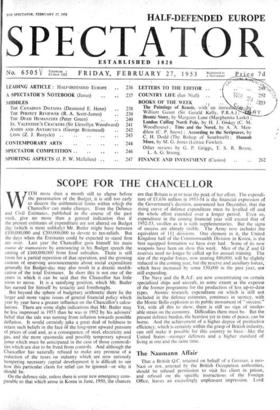SCOPE FOR THE CHANCELLOR
But beyond the sphere of budgetary arithmetic there lie the larger and more vague issues of general financial policy which year by year have a greater influence on the Chancellor's calcu- lations. There are some slight indications that Mr. Butler may be less impressed in 1953 than he was in 1952 by his advisers' belief that the tide was turning from inflation towards possible deflation. It would certainly take a great deal of boldness to retain such beliefs in the face of the long-term upward pressure of prices of coal and, as a consequence. of steel, electricity and gas, and the more spasmodic and possibly temporary upward jump which must be anticipated in the case of those commodi- ties which are due to be freed from controls. And although the Chancellor has naturally refused to make any promise of a reduction of the taxes on industry which are now seriously hampering necessary capital development it is difficult to see how this particular claim for relief can be ignored—or why it should be.
On the defence side, unless there is some new emergency com- parable to that which arose in Korea in June, 1950, the chances are that Britain is at or near the peak of her effort. The expendi- ture of £1,636 million in 1953-54 is the financial expression of the Government's decision, announced last December, that the rising curve of defence expenditure must be levelled off and the whole effort extended over a longer period. Even so, expenditure in the coming financial year will exceed that of 1952-53, swollen as it is with supplementaries. But the signs of success are already visible. The Army now includes the equivalent of 111 divisions. One element in it, the United Kingdom half of the Commonwealth Division in Korea, is the best equipped formation we have ever had. Some of its new weapons have been on show this week. Men of the Z and G reserves need no longer be called up for annual training. The size of the regular forces, now nearing 880,000, will be slightly reduced in the coming year, but the reserve and auxiliary forces, which have increased by some 150,000 in the past year, are still expanding.
The Navy and the R.A.F. are now concentrating on certain specialised ships and aircraft, to some extent at the expense of the former programme for the production of less up-to-date types. Atomic research, expenditure on which is still not included in the defence estimates, continues in secrecy, with the Monte Bello explosion as its public monument of " success." Yet, with all this to show, there is still no sign of intoler- able strain on the economy. Difficulties there must be. But the present defence burden, the heaviest yet in time of peace, can be borne. And the achievement of a higher degree of productive efficiency, which is certainly within the grasp of British industry. can still make it possible for this country to have—like the United States—stronger defences and a higher standard of living at one and the same time.


































